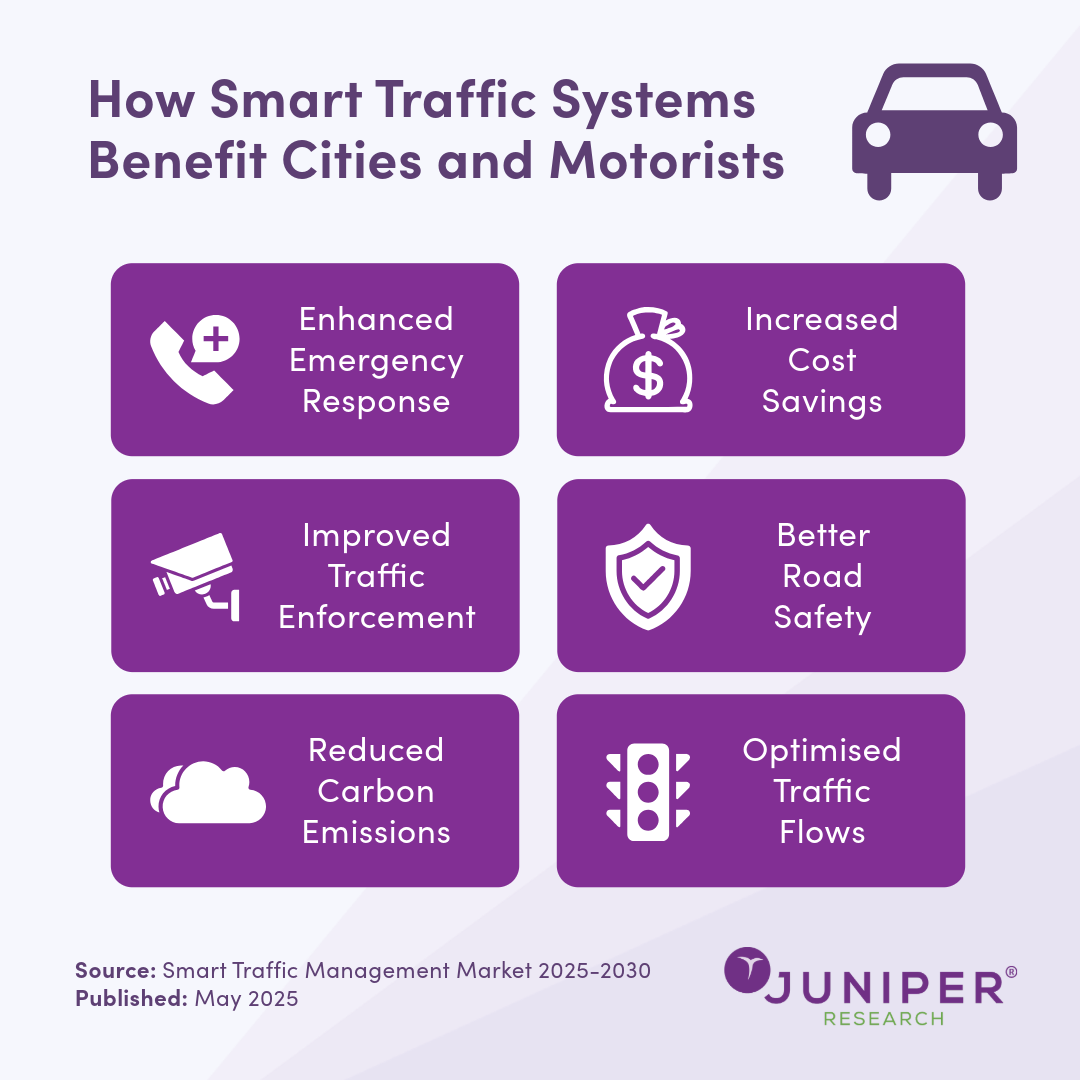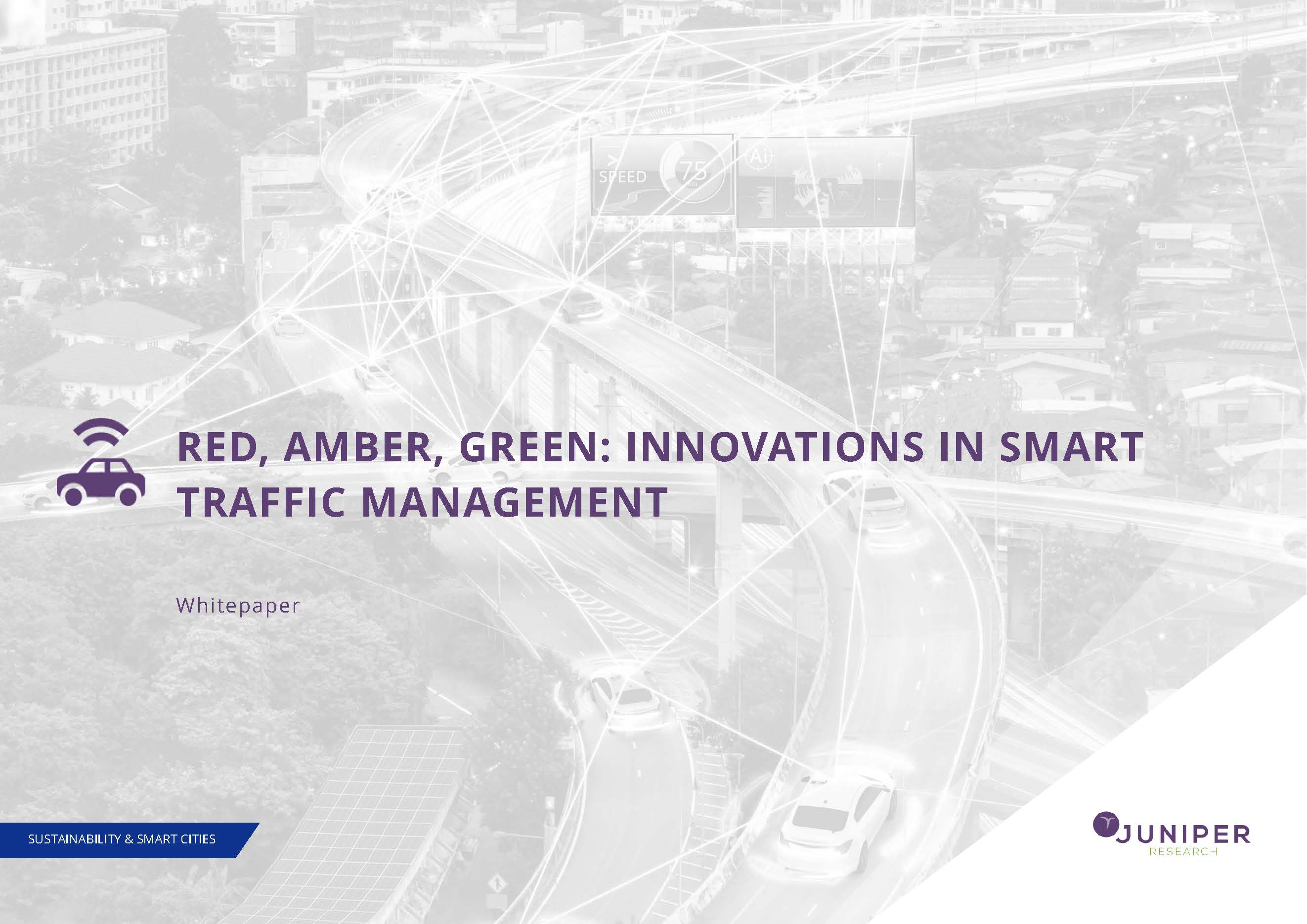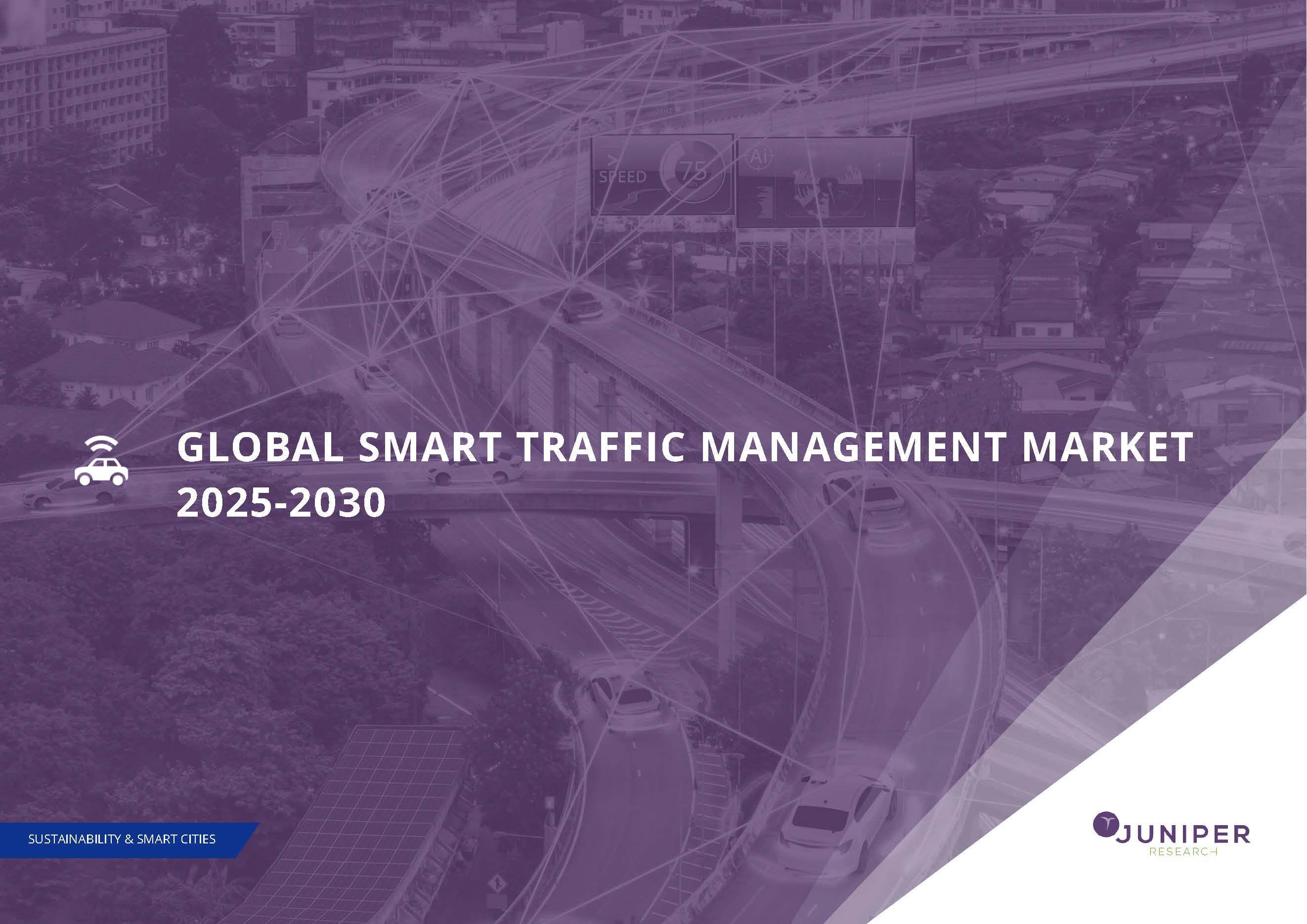How Smart Traffic Management Benefits Cities and Motorists


As cities face increasing pressure from growing populations and mounting congestion, smart traffic management systems are emerging as a critical solution. By combining sensors, data analytics, and AI-driven control, these systems help city planners and motorists alike navigate urban environments more efficiently and safely. And the momentum is growing fast. with our latest research predicting the smart traffic management market to more than double over the next five years.
Here’s how smart traffic management is delivering real benefits on the road:
Enhanced emergency response
When every second counts, smart traffic systems give emergency services the edge. By detecting accidents and congestion in real time, these systems can automatically adjust traffic signals to create clear paths for ambulances, fire trucks, and police vehicles. The result? Faster response times, improved outcomes, and more lives saved.
Increased cost savings
Traditional traffic control systems often rely on fixed schedules and manual oversight. In contrast, smart systems use real-time data to optimise signal timings and reduce the need for on-the-ground monitoring. This not only lowers operational costs for city authorities but can also reduce the long-term wear and tear on infrastructure (and motorists' vehicles) through more efficient traffic flows.
Improved traffic enforcement
From automatic number plate recognition to integrated speed cameras, smart traffic management enhances enforcement without adding strain on police resources. These systems can identify violations as they happen and provide evidence for prosecution, creating a strong deterrent for dangerous driving behaviours.
Better road safety
Smart traffic systems can adapt to changing road conditions, monitor pedestrian crossings, and even detect potential hazards before they escalate. With better situational awareness and faster response times, cities can reduce the number of accidents and make streets safer for all users—including cyclists and pedestrians.
Reduced carbon emissions
Inefficient traffic contributes significantly to urban pollution. By reducing congestion and idle time, smart systems help cut down vehicle emissions. This not only improves air quality but also helps cities meet their environmental targets and move closer to net-zero transport networks.
Optimised traffic flows
The ability to analyse traffic patterns in real time allows cities to fine-tune signal timings, redirect traffic during peak hours, and minimise bottlenecks. For motorists, that means shorter journey times, fewer delays, and a much smoother driving experience.
Source: Global Smart Traffic Management Market 2025-2030
Download the Whitepaper: Red, Amber, Green: Innovations in Smart Traffic Management
Read the Press Release: Smart Traffic Management Market Growth Fuelled by Sustainability & Urbanisation, Reaching $20 Billion by 2027
Latest research, whitepapers & press releases
-
 ReportMarch 2026Fintech & PaymentsCross-border Payments Market: 2026-2030
ReportMarch 2026Fintech & PaymentsCross-border Payments Market: 2026-2030Our Cross-border Payments research suite provides a comprehensive and in-depth analysis of the evolving cross-border payments landscape; enabling stakeholders such as businesses, financial institutions, payment service providers, card networks, regulators, and technology infrastructure providers to understand future growth, key trends, and the competitive environment.
VIEW -
 ReportFebruary 2026Telecoms & ConnectivityMobile Messaging Market: 2026-2030
ReportFebruary 2026Telecoms & ConnectivityMobile Messaging Market: 2026-2030Juniper Research’s Mobile Messaging research suite provides mobile messaging vendors, mobile network operators, and enterprises with intelligence on how to capitalise on changing market dynamics within the mobile messaging market.
VIEW -
 ReportFebruary 2026Fintech & PaymentsKYC/KYB Systems Market: 2026-2030
ReportFebruary 2026Fintech & PaymentsKYC/KYB Systems Market: 2026-2030Our KYC/KYB Systems research suite provides a detailed and insightful analysis of an evolving market; enabling stakeholders such as financial institutions, eCommerce platforms, regulatory agencies and technology vendors to understand future growth, key trends and the competitive environment.
VIEW -
 ReportFebruary 2026Telecoms & ConnectivityRCS for Business Market: 2026-2030
ReportFebruary 2026Telecoms & ConnectivityRCS for Business Market: 2026-2030Our comprehensive RCS for Business research suite provides an in‑depth evaluation of a market poised for rapid expansion over the next five years. It equips stakeholders with clear insight into the most significant opportunities emerging over the next two years.
VIEW -
 ReportFebruary 2026Fintech & PaymentsMobile Money in Emerging Markets: 2026-2030
ReportFebruary 2026Fintech & PaymentsMobile Money in Emerging Markets: 2026-2030Our Mobile Money in Emerging Markets research report provides detailed evaluation and analysis of the ways in which the mobile financial services space is evolving and developing.
VIEW -
 ReportJanuary 2026IoT & Emerging TechnologyPost-quantum Cryptography Market: 2026-2035
ReportJanuary 2026IoT & Emerging TechnologyPost-quantum Cryptography Market: 2026-2035Juniper Research’s Post-quantum Cryptography (PQC) research suite provides a comprehensive and insightful analysis of this market; enabling stakeholders, including PQC-enabled platform providers, specialists, cybersecurity consultancies, and many others, to understand future growth, key trends, and the competitive environment.
VIEW
-
 WhitepaperFebruary 2026Telecoms & Connectivity
WhitepaperFebruary 2026Telecoms & ConnectivityHow Social Media Will Disrupt Mobile Messaging Channels in 2026
Our complimentary whitepaper, How Social Media Will Disrupt Mobile Messaging Channels in 2026, explores the challenges and opportunities for operators and enterprises as social media traffic continues to increase.
VIEW -
 WhitepaperFebruary 2026Telecoms & Connectivity
WhitepaperFebruary 2026Telecoms & ConnectivityProtecting Users from Scam Ads: A Call for Social Media Platform Accountability
In this new whitepaper commissioned by Revolut, Juniper Research examines how scam advertising has become embedded across major social media platforms, quantifies the scale of user exposure and financial harm, and explains why current detection and enforcement measures are failing to keep pace.
VIEW -
 WhitepaperFebruary 2026Fintech & Payments
WhitepaperFebruary 2026Fintech & PaymentsKnow Your Agents (KYA): The Next Frontier in KYC/KYB Systems
Our complimentary whitepaper, Know Your Agents (KYA): The Next Frontier in KYC/KYB Systems, examines the state of the KYC/KYB systems market; considering the impact of regulatory development, emerging risk factors such as identity enabled fraud, and how identity and business verification is evolving beyond traditional customer and merchant onboarding toward agent-level governance.
VIEW -
 WhitepaperFebruary 2026Telecoms & Connectivity
WhitepaperFebruary 2026Telecoms & Connectivity3 Key Strategies for Capitalising on RCS Growth in 2026
Our complimentary whitepaper, 3 Key Strategies for Capitalising on RCS Growth in 2026, explores key trends shaping the RCS for Business market and outlines how mobile operators and platforms can accelerate adoption and maximise revenue over the next 12 months.
VIEW -
 WhitepaperFebruary 2026Fintech & Payments
WhitepaperFebruary 2026Fintech & PaymentsThe Next Steps for Mobile Money – Interoperability and Openness
Our complimentary whitepaper, The Next Steps for Mobile Money – Interoperability and Openness, analyses how interoperability and open platforms can drive new growth opportunities through partnerships with key stakeholders.
VIEW -
 WhitepaperJanuary 2026IoT & Emerging Technology
WhitepaperJanuary 2026IoT & Emerging TechnologyPreparing for Q-Day: Post-quantum Security Shift
Our complimentary whitepaper, Preparing for Q-Day: Post-quantum Security Shift, assesses the factors which are increasing interest in adopting PQC, and challenges to PQC adoption. Additionally, it includes a forecast summary of the global spend on PQC by 2035.
VIEW
-
Telecoms & Connectivity
MVNO Subscriber Revenue to Exceed $50 Billion Globally in 2030
March 2026 -
Fintech & Payments
QUBE Events is excited to bring back the 24th NextGen Payments & RegTech Forum - Switzerland
February 2026 -
Telecoms & Connectivity
OTT Messaging Apps to Exceed 5 Billion Users Globally by 2028; Driving Shift in Enterprise Communication Strategies
February 2026 -
Fintech & Payments
Calling All Fintech & Payment Innovators: Future Digital Awards Now Open for 2026
February 2026 -
Telecoms & Connectivity
Operator RCS for Business Revenue to Reach $3 Billion Globally by 2027, Growing 150% in Two Years
February 2026 -
Fintech & Payments
KYC & KYB Systems Spend Outside Financial Sector to Grow 105% by 2030 Globally, as KYC Moves Beyond Banking
February 2026




















